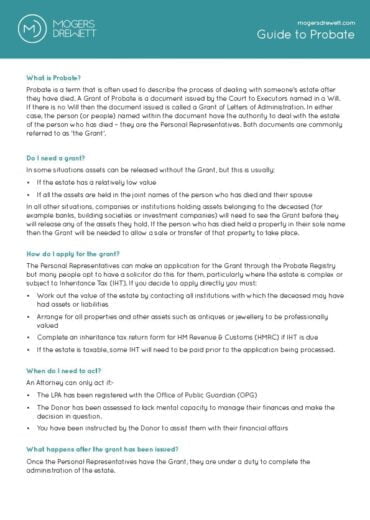Contentious probate solicitors
While most estate administrations progress without any problems, disagreements do arise sometimes. If you are an Executor or due to benefit under a Will and you are experiencing difficulties, we can help.
Getting impartial legal advice right away lets you resolve problems early instead of being pulled into costly Court proceedings. Our contentious probate solicitors in Bath, Wells, Sherborne and Frome have extensive experience acting for trustees, Executors, personal representatives, beneficiaries and individuals to resolve a wide range of disputes involving estates, trusts and land.
We understand that disputes often involve disagreements within the family. We will let you know where you stand on an inheritance dispute and make it our goal to solve it quickly and sympathetically.
Our contentious probate services
Removing Executors
If Executors are not acting in the estate’s best interests, you should take legal advice as soon as possible. Our specialists will aim to ensure that the Executors are removed and your inheritance is distributed correctly.
Making a claim against an Executor or trustees
Executors and trustees have a duty to carry out certain tasks. If you believe they are distributing assets incorrectly or failing in other duties, you may be able to make a claim against them.
Alternatively, you may be an Executor or trustee where a claim is being brought against the estate. In this case, we can provide advice or assistance in defending the claim.
Defending claims by beneficiaries
If you have found that there is a lack of information about an estate, no apparent reason for a delay or that as a beneficiary you have received substantially less than expected, there might be an issue with the estate. If this happens, legal advice from our expert probate solicitors can help you defend your claim to rightful inheritance.
Challenging a Will
Seek advice on challenging a Will if you have concerns that:
- Pressure may have been applied at the time of preparing a Will
- The terms of the Will do not reflect the intentions of the deceased
- You or another family member has been unfairly excluded
Inheritance Act claims
The following people can make a claim under the Inheritance Act where someone has died without leaving sufficient money for their continued wellbeing:
- A spouse or civil partner of the deceased
- A divorced spouse or a separated civil partner of the deceased, provided that they have not remarried or entered into a new civil partnership
- Any person who lived with the deceased for a minimum of two years prior to their death
- A child of the deceased (including children over the age of 18)
- Anyone who was treated as their child by the deceased person, including adopted children, fostered children and step children
- Anyone being cared for by the deceased person prior to their death
Court of Protection disputes
When there’s a dispute in relation to a vulnerable person’s affairs, the Court of Protection has the jurisdiction to get involved and resolve them.
Farming inheritance and succession disputes
Sometimes people make decisions based on what they expect to inherit. For example, you might turn down the opportunity to work on a family farm if your parents promised that you would inherit it.
Proprietary estoppel is a legal concept that can enforce a promise of property ownership if you have already made related decisions that have left you worse off. If you find yourself in this position, talk to us to find out more.
Next step: Get in touch to discuss contentious Wills and probate
Whatever the dispute, and whether you are looking to bring or defend an inheritance claim, you can contact our friendly team on: 0800 533 5349 or enquiries@mogersdrewett.com. We can advise you on costs, timescales and whether you have a strong case.
Meet the team
Frequently asked questions
Anyone who has a beneficial interest, or potential beneficial interest, in the deceased’s estate can contest the Will, if there are grounds for them to do so.
There are a number of grounds on which a Will can be contested or challenged, including:
- The validity of a Will – you can challenge a Will if it wasn’t drafted correctly
- If the deceased did not have the mental capacity to make a Will
- If fraud or forgery has occurred in relation to the Will
- If you believe the deceased was unduly influenced when they made the Will
People who can claim against an estate include:
- A spouse or civil partner
- A former spouse or partner, provided they have not remarried or registered a new civil partnership, or have a court order preventing them from making a claim
- Anyone cohabitating with the deceased for two years or more
- Any children, but not stepchildren unless they have also been adopted
- Any person whom the deceased maintained financially or in another valuable manner
To protect your estate, it is important to have your Will professionally drafted so it is watertight, then discuss your intentions with family members.
A Deed of Variation is a legal document in which one or more beneficiaries of an estate want to change the amount of inheritance they are due to receive. They could pass some or all of it on to someone else.
A personal representative (PR) is a person responsible for dealing with the estate (possessions, property, shares or bank accounts) of a deceased person. A PR can also be known as an Executor or an administrator.
If a landowner promises their land or property will transfer to another person at a later date, that person might make decisions based on their expected inheritance. For example, they might invest money into that property, agree to work there for low wage or turn down other opportunities.
However, if the landowner goes back on their promise or fails to update their Will to reflect it, the person to whom it was promised could find themselves in a difficult position.
Proprietary estoppel is a legal mechanism in which someone in this situation can enforce the promise of property ownership. Cases of proprietary estoppel are often related to farming inheritance.







